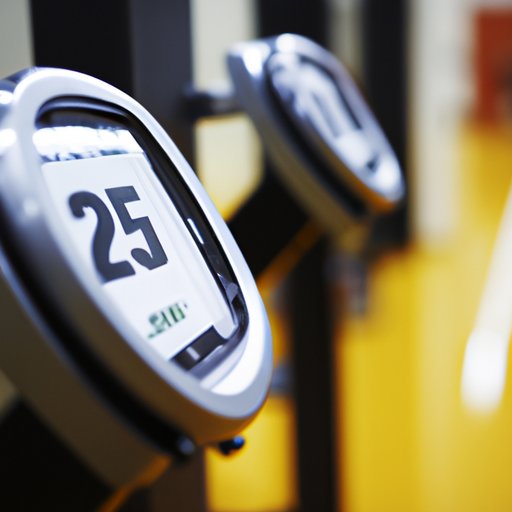Introduction
Working out at the gym is an essential part of maintaining a healthy lifestyle. Exercise has myriad benefits, including improved physical fitness and mental wellbeing, stress relief, and weight management. But how long should you stay at the gym to get the most out of your workout? It’s important to find the right balance between getting enough exercise and over-exerting yourself. In this article, we’ll explore the benefits and drawbacks of spending more time at the gym, provide guidelines for optimal workout length, and offer tips for knowing when to leave so you can make the most out of your gym time.
How Long Should You Spend at the Gym to Maximize Your Workout?
When it comes to deciding how long you should stay at the gym, there are several factors to consider. According to the American College of Sports Medicine (ACSM), the ideal amount of time for a workout depends on your goals. If you’re trying to improve your endurance, for example, the ACSM recommends doing at least 30 minutes of continuous aerobic activity five days a week. For resistance training, they suggest 8–10 exercises targeting all major muscle groups, with 8–12 repetitions per set. Each exercise should be done twice a week, with 48 hours of rest in between sessions.
In addition to your goals, the amount of time you spend at the gym should also depend on your current fitness level. If you’re just starting out, you may want to start with shorter workouts and gradually increase the duration as your fitness improves. Similarly, if you’ve been exercising for a while but are looking to mix things up, you may want to add more sets or reps to your routine.
The Pros and Cons of Working Out for Extended Periods of Time
There are both advantages and disadvantages to spending longer amounts of time at the gym. Let’s take a look at the pros and cons of working out for extended periods of time.
Benefits of Working Out for Longer Periods
One of the main benefits of staying at the gym for longer periods of time is that it allows you to get more out of your workout. According to a study published in the journal Sports Medicine, “longer-duration exercise can enhance overall fitness, allowing for greater physiological adaptations, such as increased muscular strength and endurance.” In addition, longer workouts can help you burn more fat and calories and can lead to faster results.
Potential Pitfalls of Working Out for Too Long
It’s important to be aware of the potential pitfalls of spending too much time at the gym. Over-exercising can lead to fatigue, muscle soreness, and even injury. Additionally, if you’re not getting enough rest in between workouts, you may find that your performance starts to suffer. As Dr. Chris Mohr, a sports nutritionist, explains, “If you’re consistently exercising without enough rest, then you’re going to feel tired and sluggish, and you’re not going to have the energy to perform at your best.”
A Guide to Knowing When You’ve Stayed Too Long at the Gym
Now that you know the potential benefits and drawbacks of spending extra time at the gym, it’s important to understand the signs that you’ve spent too much time there. Here are some key indicators that you may need to take a break:
- You’re feeling fatigued or exhausted
- Your muscles are tight or sore
- You’re having difficulty concentrating
- You’re feeling unmotivated
If you’re experiencing any of these symptoms, it’s time to take a break and give your body a chance to recover. It’s important to listen to your body and not push yourself too hard.
Strategies for Avoiding Over-Exertion
One way to avoid over-exerting yourself is to plan your workout in advance. Set a realistic goal for the time you want to spend at the gym and stick to it. Additionally, make sure to incorporate rest days into your schedule. Rest days give your body time to recover and rebuild muscle, which is essential for maximizing your gains.

Making the Most Out of Your Gym Time: Knowing When to Leave
Now that you know the benefits and drawbacks of spending extra time at the gym, as well as the signs that you’ve spent too much time there, let’s look at some tips for maximizing your time at the gym.
Tips for Knowing When to End Your Workout
One way to know when to end your workout is to set a timer. This will help you keep track of your progress and ensure that you don’t stay at the gym for too long. Additionally, it’s important to pay attention to your body. If you’re feeling tired or sore, it’s time to call it a day.
Techniques for Maximizing Your Time at the Gym
To maximize your time at the gym, focus on compound movements that target multiple muscle groups at once. This will help you get more out of your workout in less time. Additionally, make sure to warm up before you start your workout and cool down afterwards. Warming up and cooling down helps prevent injury and prepares your body for the workout.
Conclusion
Staying at the gym for extended periods of time can have both positive and negative effects on your fitness journey. To ensure that you get the most out of your workout, it’s important to factor in your goals, fitness level, and current state of fatigue. Additionally, it’s important to know the signs that you’ve stayed too long at the gym and to use strategies for avoiding over-exertion. Ultimately, by following the tips outlined in this article, you can make the most out of your gym time and reach your fitness goals.
(Note: Is this article not meeting your expectations? Do you have knowledge or insights to share? Unlock new opportunities and expand your reach by joining our authors team. Click Registration to join us and share your expertise with our readers.)
